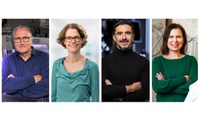Outstanding research at the Faculty of Engineering
The University of Freiburg is celebrating four ERC Synergy Grants at once – and two of them are awarded to outstanding researchers from the Faculty of Engineering: photovoltaics expert Prof. Dr. Stefan Glunz (INATECH) and microsystems engineer Prof. Dr. Çağlar Ataman (IMTEK).
In addition to Glunz and Ataman, molecular biologist Prof. Dr. Claudine Kraft and archaeologist Dr. Susanne Brather-Walter were also honored. Furthermore, Prof. Dr. Rüdiger Quay has secured an ERC Synergy Grant for the Freiburg Fraunhofer Institute for Applied Solid State Physics (IAF), which he heads; Quay is also a professor at the University of Freiburg’s Institute for Sustainable Systems Engineering (INATECH).
With its Synergy Grants, the ERC supports international, interdisciplinary research teams whose work meets the criteria of scientific excellence and promises highly impactful results. This year, 66 out of 712 submitted proposals were selected for funding.
‘Four Synergy Grants testify to the great strength of Freiburg research and how firmly embedded we are in European networks’, says Prof. Dr. Stefan Rensing, Vice Rector for Research and Innovation. ‘The selected research projects treat highly relevant topics and can make important contributions to overcoming social challenges.’ In total, the four projects will receive around 41 million euros from the ERC over a six-year period; the University of Freiburg will receive a good nine million euros of this amount.
Prof. Dr. Stefan Glunz: A new generation of solar cells
The project ‘UltimatePV – Ultimate Photovoltaics’ by Prof. Dr. Stefan Glunz aims to rethink the modern solar cell and develop a new generation of resource-efficient photovoltaic technologies with highest conversion efficiencies.
The use of novel photonic structures will significantly improve the optical properties of the solar cells, leading to a tenfold reduction in material consumption. The charge carrier concentration increases considerably in the resulting ultrathin solar cells. This makes it possible to extract the light-excited charge carriers via energy-selective contacts before they lose some of their energy through thermalization. ‘Such concepts could enable future efficiencies far exceeding the current state of the art and make a fundamental contribution to the energy transition’, says Glunz.
Glunz serves as professor for photovoltaic energy conversion at the University of Freiburg’s Department of Sustainable Systems Engineering (INATECH) and as director of the photovoltaics research area at the Freiburg Fraunhofer Institute for Solar Energy Systems ISE. Also collaborating on the project are Prof. Dr. Christoph Ballif from EPFL (École polytechnique fédérale de Lausanne, Switzerland) and Dr. Stéphane Collin from the National Centre for Scientific Research (CNRS) in Paris, France. In addition, the project is supported by partner institutions like the Fraunhofer ISE, the Centre Suisse d’Electronique et de Microtechnique (CSEM), the Center for Nanoscience and Nanotechnology (C2N), and the Institut Photovoltaïque d’Île-de-France (IPVF). The project will receive just under ten million euros from the ERC, 3.35 million euros of which will go to the University of Freiburg.
JProf. Dr. Çağlar Ataman: Theranostics for pancreatic cancer
The project ‘Zee-Zoom-Zap: A New Paradigm for Cancer Theranostics’ by junior professor Dr. Çağlar Ataman is investigating a new theranostic approach – combining therapy and diagnostics – for pancreatic cancer. It involves combining early diagnosis, non-invasive biopsy, and local therapy and performing them optically in a single endoscopic intervention.
One of the main challenges is to enable specific and high-resolution imaging at the cellular level and at a previously unachieved depth. Ataman and his team are responsible for developing multifunctional optical catheters that can be used for fluorescence studies and 3D tomographic microscopy through the entire pancreatic duct. Using the latest 3D micro- and nanoprinting technologies, the researchers aim to create a micro-manufacturing pipeline that enables the monolithic manufacturing of endoscopic microscopes in clinical quality. ‘There has been little progress in the early diagnosis and therapy of aggressive pancreatic cancer for decades’, says Ataman. ‘We’re grateful to the ERC Synergy Programme for giving us the opportunity to hopefully change that.’
Ataman has been a junior professor at the University of Freiburg’s Department of Microsystems Engineering (IMTEK) since 2022, where he focuses on biomedical imaging. Also collaborating on the ERC-funded project are Prof. Dr. Andreas Kjær from the University of Copenhagen, Denmark, Dr. Peter Eskil Andersen from the Technical University of Denmark (DTU), and Prof. Dr. Miguel A. González Ballester from Pompeu Fabra University in Barcelona, Spain. The ERC is providing the project with a total of ten million euros in funding. The Freiburg share is somewhat more than two million euros.
And another ERC Synergy Grant has been awarded to Freiburg: Prof. Dr. Rüdiger Quay has received a grant for his ‘DISRUPT’ project at Freiburg’s Fraunhofer Institute for Applied Solid State Physics IAF. Quay also serves as professor for energy-efficient high-frequency electronics at the University of Freiburg’s Department of Sustainable Systems Engineering (INATECH). His project involves an innovative technological approach that could lower the energy consumption of the next generation of mobile phone networks by 50 per cent.
‘It’s a great honour to be recognized for many years of work on highly scalable high-frequency semiconductor technologies in Europe with an ERC Synergy Grant’, says Quay. ‘I’m grateful to have such competent colleagues at the Fraunhofer IAF and the University of Freiburg, as well as in the DISRUPT project.’ The other institutions involved in the project are the Delft University of Technology, Netherlands, and the University College Dublin, Ireland. It will receive around ten million euros in funding.
Link to original press release with detailed information about the two other research projects: „DegrAbility: On the Degradability of Protein Aggregates by Autophagy”, Prof. Dr. Claudine Kraft and „CoCo – Connected Communities in early medieval Europe“, Dr. Susanne Brather-Walter: https://uni-freiburg.de/en/four-erc-synergy-grants-for-university-of-freiburg-researchers/
Contact:
Kerstin Steiger-Merx
Representative PR/Marketing
Faculty of Engineering
University of Freiburg
Tel.: +49 (0)761/203-8056
Email: steiger-merx@tf.uni-freiburg.de

